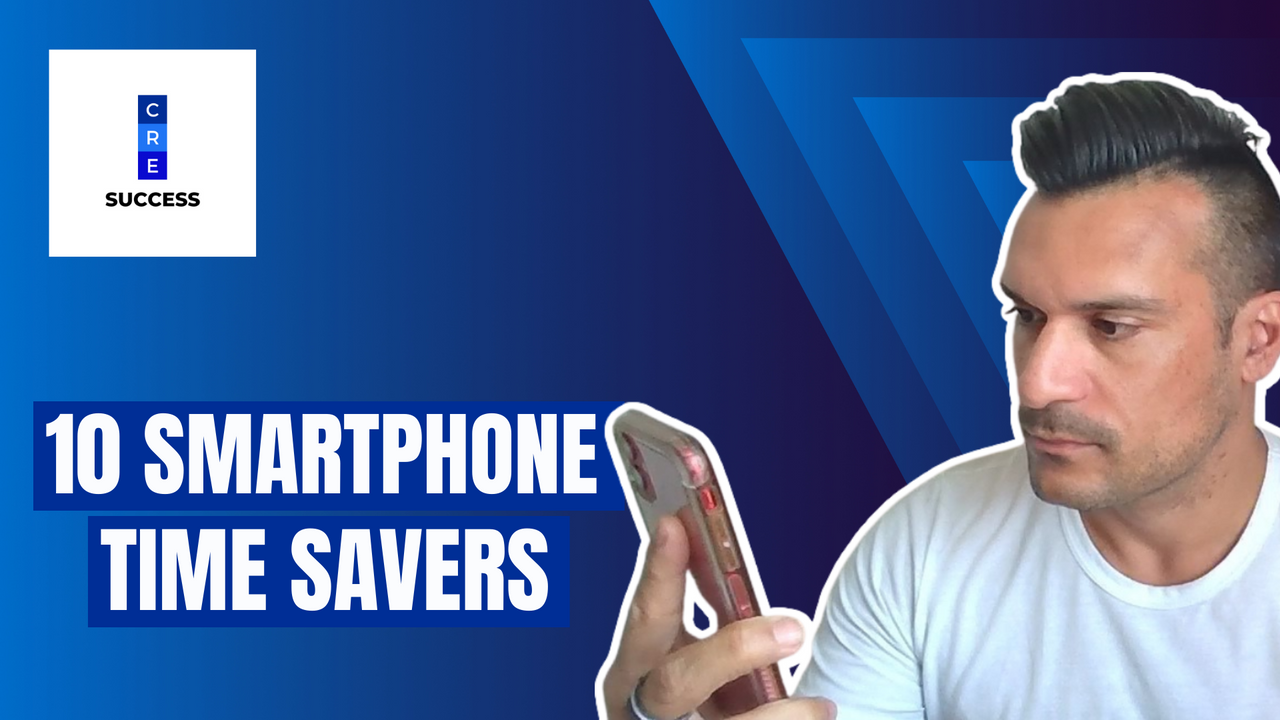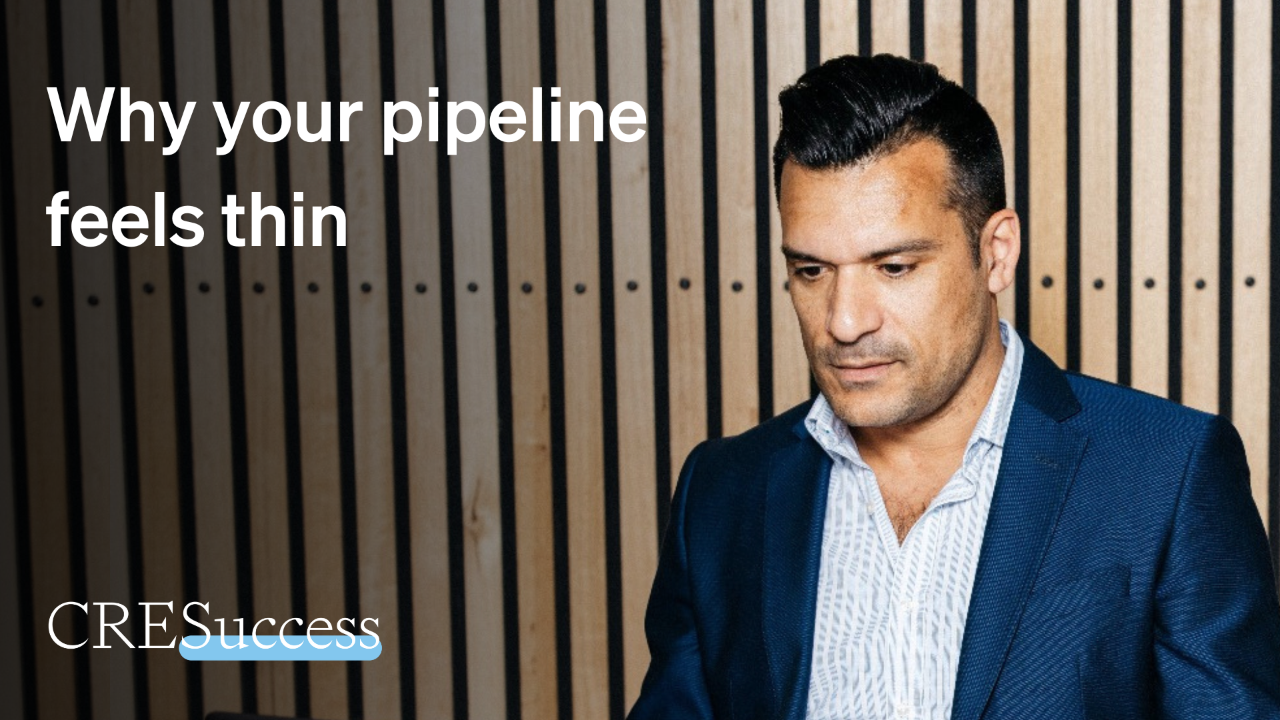Turn your smart phone into a time saver in commercial real estate
May 26, 2022
I don’t know about you, but I am guilty of wasting too much time on my smartphone.
In fact, when I checked the stats, I was shocked by just how much time was spent staring at my screen – and how many times I picked up my phone every day.
If you’re like me, and want your smartphone to become a time saver, rather than being a time suck, this list of 10 ways your phone can help you be more efficient in commercial real estate will really help!
Start saving time now by checking out episode 89 of CRE Success: The Podcast.
Episode transcript:
What's the biggest waste of time that exists in your life?
If you're anything like me, or like most people in the world right now, it's probably the thing that I'm going to talk about today, and help you find some more efficient ways to use it.
Hello, and welcome to Episode 89 of the show. My name is Darren Krakowiak.
And this is CRE Success: The podcast, where we're here to help commercial real estate professionals save time, earn more, and be top performers in their market.
And I don't spend as much time talking about saving time. So that's the focus of today's episode.
And the question I want you to ask yourself is, 'How much time am I wasting on my smartphone?'
Whether you like iPhone or Android, a lot of us spend too much time on our phones.
And I think we sometimes fool ourselves into believing that we are actually using our phones productively when actually were taking ourselves away from more productive activities.
And if you've never done this before, and it's surprising to me how many people haven't, but have a look in. If you're an Apple user, you can go to screen time.
I'm not sure what it's called in Android, but I'm guessing it's something similar.
And you'll get the knack of what I'm talking about when I tell you how to do it on iPhone, go into screen time inside your settings and have a look at things like the total screen time that you spend every day or week just looking at your phone.
Have a look at how much time you're spending in each app, it will give you that information.
It will also tell you the number of times that you pick up your phone every day.
And most people when they look at that number are a little bit shocked that they pick up their phone that many times.
That they spend so much time on particular apps, or that they just spend that much time on their phone every single day.
So, I want to give you today 10 tips that will help you spend less time on your phone or will help you make the time that you're using your phone more efficient.
So, let's get right into the list.
And number one is to turn off most notifications.
Now, I would encourage you really to turn all of them off if you can.
But if you can't turn all of them off, you want to still be able to get messages from your significant other for example, or maybe you want to know whenever there's a charge going up on your credit card.
But definitely you should be turning off social media notifications.
You should be turning off notifications from new sites when they're trying to lure you in to their click bait.
And definitely you should be turning off the alerts for emails.
The number of people who have alerts coming in every time there's an email, I'm going to tell you a little secret: If it's that important, they'll call you.
And if your phone's buzzing at you 100 or more times a day, because most people receive at least 100 emails a day. That kind of sounds a little bit stressful to me.
So, number one is to turn off, most if not all, notifications.
Number two is to delete the apps that you don't need.
And I know my phone actually starts to delete them from the screen or at least I've got to push a button to download them again, if I haven't used it for a certain time.
I think that's because I've got so little space left on my phone.
But if you notice that you're not using an app very often, then it's just taking up valuable real estate on your phone.
You don't need it there.
So why not delete the apps that you don't use.
Because if they're not being used, they're not useful.
And that means that they don't need to be there. And they have no opportunity to lower your back in the future.
Number three is the reverse of this, which is to download the apps that you do need to use a lot of.
So, if you find yourself logging into certain platforms, using certain websites.
For example, if there's a coffee shop that you go to every day, and they can process your order through an app rather than through Safari or through your browser, you can use the app and that's going to be much faster than typing in your credit card details every day, right?
So yes, use your phone apps when it's faster to do something because your phone can help you be more productive.
So, to save you time logging in the browser every single day, find it. There's an app that can make that faster.
Let's move on to number four. It is to set limits for those times suck apps.
On my phone every single day, if I've spent more than 30 minutes in combined time on Facebook, Instagram, and LinkedIn, it will then lock me out of those apps.
And then I will need to ask permission from the phone to give me another five, I think it's 15 minutes more, and then you can unlock it for the whole day if you need to.
But that creates some friction in the process, which means that I'm more inclined to not spend more time than I already have spent wasting time scrolling through social media apps.
So, whatever the time suck is for you when you go back and you realize, "Hey, I've spent a lot of time on this app," you can then set some sort of warning or lockout setting in your phone, so you are not spending so much time in there.
So, set time limits for apps that you're spending a lot of time on.
Number five is to keep your phone out of sight in meetings.
Now, this is not so much about wasting time on your phone, but it's going to help you save time and be more efficient and effective.
Because when your phone is out of sight, it is out of mind.
And you're less likely to be thinking about whatever notifications, emails, things that are going on your phone, when you can't see it.
You'll be more focused on the person who you're speaking to, you'll be more present in that moment.
It's also polite to just put your phone out of sight when you're in a meeting.
So, put it out of sight and actually turn it off the notifications or put it on a profile that you can't then be distracted with.
Imagine you're in a meeting and your phone's going off in your pocket, vibrating at you and it's pretty distracting, right?
So, if you put it out of sight, also turn it on a setting where it can't notify you of anything, and then it can't cause you to be distracted or lose focus from what you are doing.
This is number six now and it is to use the focus profile at certain times of the day, or while you want to do deep work.
So what is deep work? That is the work that you're doing uninterrupted so you can maintain your focus.
If you go back to Season 2, Episode 3 or 4 with Steve Glaveski, we talk a lot about these sort of efficiency tips.
And when you're doing deep work, when you're in the zone, you're getting more work done within a period of time, than it will usually take down if you were interrupted.
So, a great way to help you do this is to put your phone on a certain profile setting where it cannot interrupt you.
But also, you can set in the alarm on your phone to after you've done your one hour sprint of deep work, you will then know that it's time to come out of that and to move on to the next thing.
Number seven, and someone taught me this recently is to ask Siri questions that it is quicker for Siri to answer than you could figure out for yourself.
And the great one I got was ask Siri, or Alexa or whatever your phone has, "What is the date 90 days from now?"
So, for example, if you're in a meeting and we're doing a 90-day closing, or we've got a 90-day agreement or contract, what is the effective date that this agreement closes?
Well, it's 90 days from now, which month has 31 days or 30. Brain damage, right?
Just ask your phone, "Can you give me the date 90 days from now?"
And it will give it to you that's faster than trying to figure it out yourself.
So, figure out some voice commands that actually help you save time.
Voice Commands, I think are great, and that brings me to number eight, which is to use dictation to draft emails to send texts on the go.
And he turned around and said, "Do you mind if I use my voice command to answer this message?" And I said, "Be my guest."
And I was in a cab in Brisbane recently on the way to the airport from the hotel, and the cab driver received a text message.
And he did. And it was a job from somebody who was a regular customer and he was commanding his text Siri to read the text message to him and then send the message back.
And that allowed him to safely send the text message respond to his potential customer while he was still driving.
So, dictation for emails for text messages is all possible.
And I think voice really is the way of the future and that's going to help you be more efficient and also safer using your phone while you are driving.
Number nine is to listen to podcasts and educational material, like CRE Success: The Podcasts.
But also, you can listen to audiobooks, things that help you learn and grow.
And I remember Brian Tracy, who I've talked about a couple of times on the podcast, who was really the first personal and professional development mentor that I had from afar in my life.
And one of the things he used to talk about was getting of audio books on CD, and or tapes and turning your car into a mobile University, I think, actually the term he used was the University on wheels.
Anyway, so be productive at all times. So, when you're on the go, you can still be learning by listening to content, which does help you learn and grow.
And then number ten is to something to not do. And it's don't check your phone first thing in the morning.
Don't let somebody else determine where your mind and focus go in the morning, right?
I do some of my best thinking in the shower.
And it's the things that are important to me, because I haven't yet checked my phone.
Because I've finally trained myself to not check my phone first thing in the morning.
Because there's only other people's priorities in there, as I said, so don't check your phone first thing in the morning.
Use it as an alarm. If you want to turn the alarm off, and then don't look at it.
Wait some time, let your brain go to where it wants to go.
And that will help you get more of the things that are important.
More fundamentally on the idea of saving time is the idea of not trying to do something yourself, instead, actually leveraging the experience, the knowledge, the know-how of other people.
Do what will help you think about what's important today, prioritize, and so forth.
And that is what we do inside CRE Success: Membership.
I think this industry, there aren't enough people who are offering that support. And I don't think there are enough people seeking it out.
So, the benefit of being involved in a community, like the one that we have inside CRE Success: Membership is that you're surrounded by people who want to learn and grow.
It's an investment in yourself.
I'm there to support all our members and our members are also there to support each other.
So, if you want to save time, not only in tactical ways, like the content that I've just run through, which is kind of like the content that we do deliver inside our workshops each and every month, but more so on a strategic level.
If you want to save time by getting the support that you can get to help you move from A to B faster than you would if you tried to do it on your own, then I want you to go to cresuccess.co/membership.
Where you can register to be the first to know about when we open up the membership very, very soon.
I hope that you will implement some of the ideas that we've got about saving time with your smartphone from today's episode.
Thank you so much for listening. I will speak to you soon.








